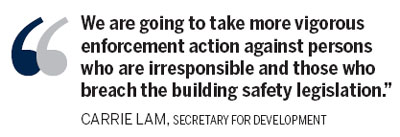BD to get tough againt rule benders
Updated: 2010-10-16 08:47
By Ming Yeung(HK Edition)
|
|||||||

Non-compliance will result in criminal prosecution: Carrie Lam
Building owners who fail to comply with orders of the Building Department (BD) will face criminal prosecution under new legislation.
Speaking at a press conference, Secretary for Development Carrie Lam unveiled policies intended to improve building safety. "This time we will take a four-pronged approach to address the problem, they include legislation, enforcement, support for old building owners as well as public education enhancement," she said.
Lam added that a new system intended to monitor minor works will be introduced by the end of the year to enable building owners to streamline their minor works projects.
Lam said the government will amend the Building Ordinance to impose sanctions on owners who fail to heed orders of the BD. At present, when BD staff, even in the company of police, are not permitted to enter premises after being denied entry by the owner. It would be considered forced entry despite the fact that staff have the statutory right to enter and inspect premises.
"We are going to empower BD to apply for a warrant to enter private premises for investigation, inspection and repair works," Lam said. "If an owner does not comply with the statutory order on notices issued by the BD and the work has to be arranged by the BD, then apart from the cost, we will amend the law with the effect that we can impose a 20 percent surcharge on the work undertaken."
In addition, if owners refuse to pay for the works carried out in compliance with the BD's orders, they will face criminal prosecution.
"We are going to take more vigorous enforcement action against persons who are irresponsible and those who breach the building safety legislation," Lam said.
The administration will also amend the Building Ordinance to regulate signboards. There are 190,000 unauthorized signboards, which would pose a danger to pedestrians in the city.
The government wants to put an end to the so-called "inflated building" problem, which has been worsening.
As announced by the Chief Executive Wednesday, the government will impose a cap amounting to 10 percent of total floor space, on building amenities that are permitted to be factored when determining the size of individual apartments.
The new rules will come into effect in April next year. Lam said they would cover requirements for sustainable design, proper calculation of the gross floor area of flats, energy efficiency and the provision of accurate property information.
Building lobbies will not qualify for exemption under the new regulations. She lamented over the areas being wasted on huge lobbies. "I personally never agree that residential buildings need to have grandiose lobbies," Lam said. "Some newspapers commented that this time the government is being tougher than what professional associations have recommended in its effort to control the inflated buildings - they are correct." Lam was referring to the 12-percent concession recommendation made by the Hong Kong Institute of Architects earlier.
Lam said she is confident that tighter rules will resolve the problem of developers misrepresenting the size of flats and will strike a balance between fulfilling environmental performance and minimizing the impact on the surrounding environment.
However, green advocates do not believe the new measure will be effective. "With the tightened floor area concession, green areas around properties may become too expensive for developers who may cut back accordingly to guarantee profits," said William Yu, head of Climate Program of World Wildlife Fund Hong Kong. Floor area concessions was originally introduced to encourage developers to build more "green space" such as green belts and hanging gardens.
China Daily
(HK Edition 10/16/2010 page1)